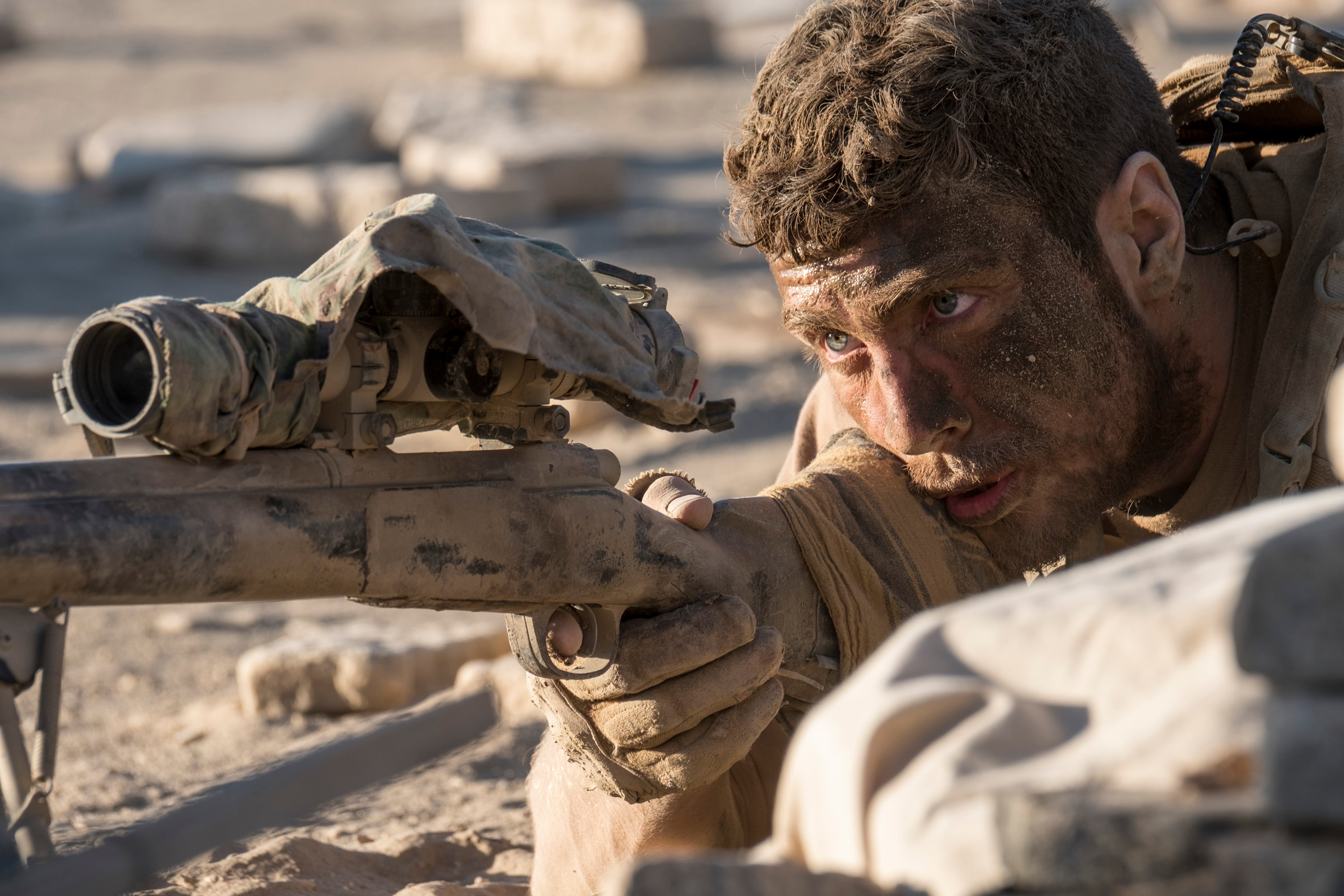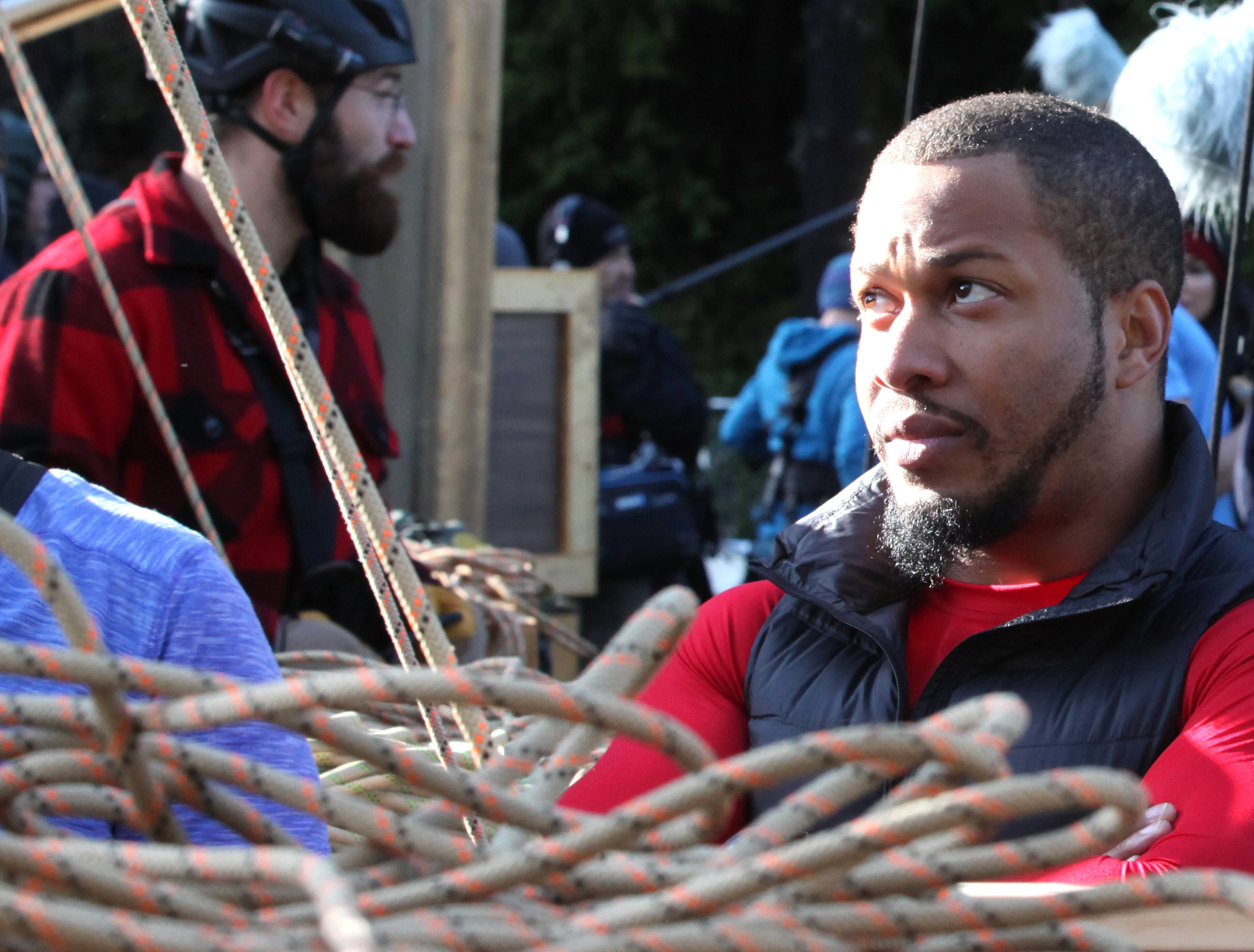When a war movie is less about action and more about mind games, the filmmakers must pay special attention to detail.
That's the case, at least, with "The Wall," the Amazon Studios-produced movie that comes out Friday starring Aaron Taylor-Johnson ("Avengers: Age of Ultron") and WWE superstar John Cena. They play U.S. soldiers conducting a stakeout in the Iraqi desert that goes very wrong — Cena's character is hit by a bullet from an unknown location, and Taylor-Johnson's wounded character takes cover behind a crumbling wall, where he communicates with the mysterious sniper via radio.
With much of the 90-minute movie focused on one soldier's interactions with an unseen enemy, there's plenty of time for the audience to observe tiny details. And the filmmakers and actors wanted to make sure they got those details right.

Aaron Taylor-Johnson plays a soldier in Iraq whose main cover from an enemy sniper is a crumbling wall.
Photo Credit: David James/Courtesy of Amazon Studios and Roadside Attractions
"I experienced a whole other side of working with the military, which is the individual soldiers and veterans who helped us make this movie," said director Doug Liman, who also worked on "The Bourne Identity." He's received military support before, he said, but not like this: Gold Star wives shared stories and photos of their husbands who died while serving in the military, for instance, and veterans shared their experiences in combat.
One of those veterans, known to some simply as " The Reaper," helped the filmmakers and actors maintain authenticity by relaying his own stories from serving in Iraq and Afghanistan as a sniper.
Nick Irving served with 3rd Ranger Battalion from 2004 to 2010 and experienced something similar to what happens to the soldiers in "The Wall." In 2009, the staff sergeant was in Helmand province, Afghanistan, when his team was pinned down by an enemy sniper and Taliban insurgents.
"We were pinned down playing volleyball with bullets for about three hours," Irving told Army Times. He and five other members of his reconnaissance team were inside four-foot hole,
"Things did not look too promising," he said. "And we debated committing suicide."
Before Irving and his team could use a grenade for that purpose, a good friend of Irving's rescued them and they relocated to a chest-high ravine. They remained under attack for another 12 hours.
"Everyone had bullet holes in their clothes," he said.

Nick "The Reaper" Irving used his experiences as a sniper in Iraq and Afghanistan to help the filmmakers and actors.
Photo Credit: Olugbenro Ogunsemore/FOX
Irving knew Cena from working together on the Fox TV show "American Grit," and after Cena received the script for "The Wall," he wanted Irving to take a look.
Irving ended up flying to California and was on set for the movie's entire three-week production, adjusting the script whenever something didn't fit right with the military. Usually, it was terminology.
"We would sit inside the office and go line by line for hours on end," Irving said. "Going over and fixing different things within the script that didn't fit right with the military."
Irving also helped the actors get into the mindset of being out in the desert with an enemy. Taylor-Johnson would ask for suggestions: "How would this go about … what would you say here … how did you feel here?"
"The Wall" shows details that would happen in real life, like the proper way for Taylor-Johnson's character to apply a tourniquet and gauze after he's shot, Irving said.
One of the methods Irving used to figure out a sniper's distance was the so-called "snap-bang theory," which uses sound delay to give an idea of how far away the shot is coming from.
Without electronics in a situation like that, Irving said, you have to go back to a "gritty, on-the-fly type of sniping."
Taylor-Johnson said he also spent a week with Irving at the shooting range.
"It was very influential on a lot of the technical wording in the script," he said. "Everything we tested against him and his knowledge and he was an incredible help."
Technical aspects aside, he said, it was more learning about the banter and camaraderie of soldiers, and appreciating "the respect and the brotherhood and the honor they carry on their shoulders."
Cena echoed the sentiment that the movie focused more on the psychological part of a soldier than tactics.
"[The movie] goes against the grain in that regard," he said. "There's not a lot of fast-moving, jump-cut action, but I thought it was really, really suspenseful."
While working with Irving, Cena said he asked the veteran questions that went deeper than basic operations.
"My conversations weren't like, 'Hey man, how do you fire a rifle?' " Cena said. "The answers he gave me really helped me get in the state of mind and how you feel in certain situations."

John Cena said there is definitely pressure to accurately portray service members in movies.
Photo Credit: David James/Courtesy of Amazon Studios and Roadside Attractions
Irving said Liman asked him for a lot of advice to make the movie as accurate as possible. Liman said that one of the reasons he found "The Wall" so compelling was that he didn't need to make up outlandish details to find elements of bravery and valor.
"You can tell the stories of an ordinary soldier in the field," he said. "A story that could be happening right now as we're speaking."
Taylor-Johnson and Cena agreed that a movie about the military comes with pressure to live up to expectations and portray the story accurately.
"I hope that it works and translates well," Taylor-Johnson said.
Cena said his support of service members is unwavering, and he views them as his heroes.
"I'm very proud of the country in which I live because they protect our freedom," he said. "Because of that, I get to do what I do. When I go into imagination land and put on that uniform, you hope you do it justice."
Charlsy Panzino covers the Guard and Reserve, training, technology, operations and features for Army Times and Air Force Times. Email her at cpanzino@militarytimes.com.
Charlsy is a Reporter and Engagement Manager for Military Times. Email her at cpanzino@militarytimes.com.




